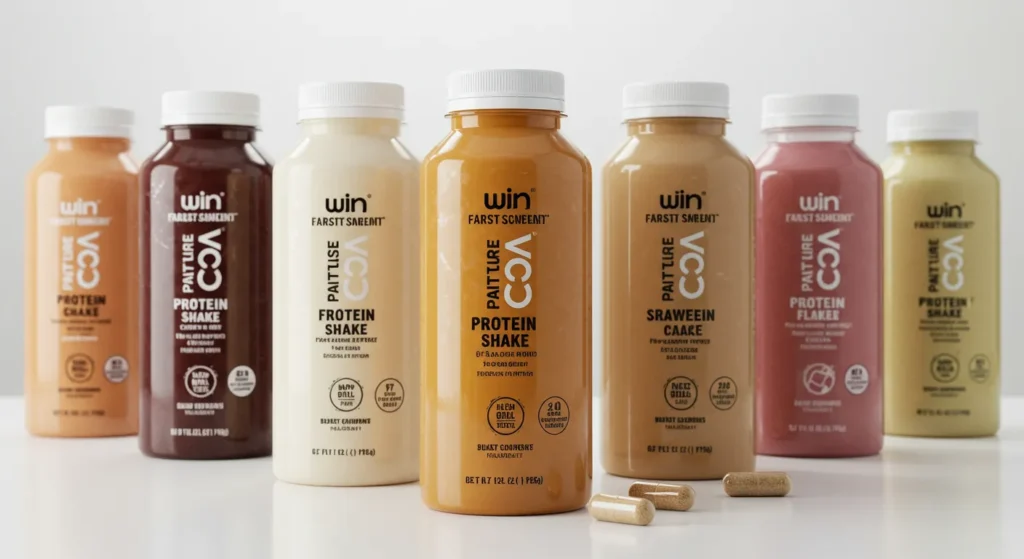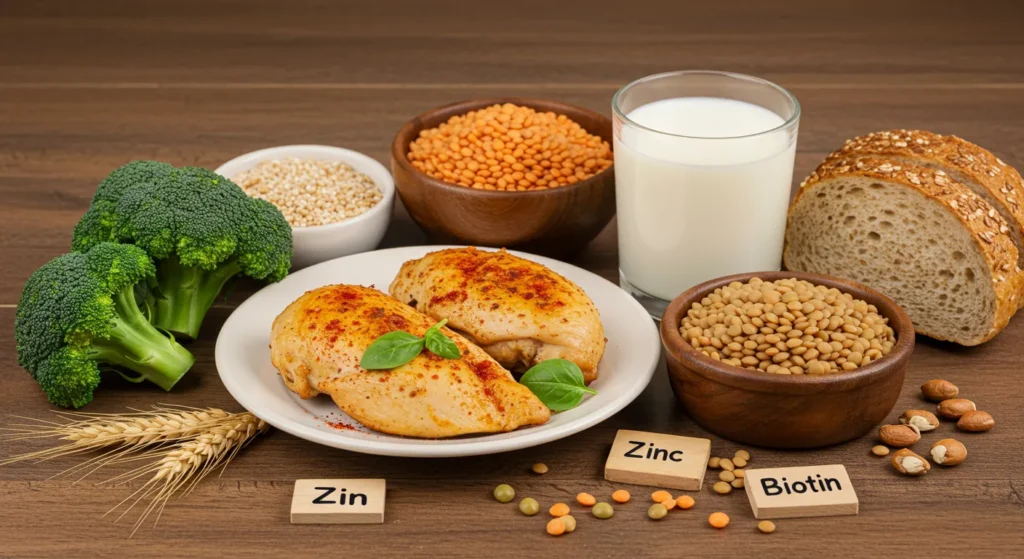If you’ve ever wondered can protein shakes cause hair loss, you’re not alone. Many fitness enthusiasts worry that their daily shake might be secretly damaging their hair.
This article breaks down the science behind protein shakes, hormone interactions like DHT, and what it means for your hair. Learn how to protect your hair without giving up your gains, discover expert insights, and get answers to your most pressing questions.
What Are Protein Shakes—And Why Do We Use Them?

Protein shakes are concentrated supplements designed to help you meet your daily protein needs, especially post-workout. They’re convenient, efficient, and widely used by athletes, gym-goers, and those recovering from illness.
Types of Protein Shakes:
- Whey Protein: The most common, derived from milk. Comes in:
- Concentrate: Less processed, retains more fats and carbs.
- Isolate: More refined, higher in protein, lower in lactose.
- Hydrolysate: Pre-digested for faster absorption.
- Plant-Based Proteins: Sourced from peas, soy, rice, or hemp. A great alternative for vegans or those with dairy intolerance.
How Could Protein Shakes Impact Hair? Understanding the Biology
Hair loss is rarely caused by a single factor—it’s usually a mix of genetics, hormones, and nutrition. But certain ingredients in protein shakes may influence hair indirectly.
Hormonal Pathway: Testosterone → DHT → Hair Follicle Miniaturization
Whey protein, especially in isolate form, may raise insulin-like growth factor 1 (IGF-1), which in turn boosts DHT (dihydrotestosterone)—a hormone linked to androgenetic alopecia (male and female pattern hair loss). High DHT levels can shrink hair follicles and shorten the hair growth cycle.
Creatine, DHEA & Other Additives
Some protein supplements contain additional compounds like:
- Creatine – Associated with increased DHT in small studies.
- DHEA – A hormone precursor that can disrupt natural hormone balance.
These ingredients may exacerbate existing hair loss tendencies, especially in genetically predisposed individuals.
What the Research Really Shows
While some anecdotal and small-scale studies suggest a connection between whey isolate and hair loss, clinical evidence remains inconclusive.
Mixed Findings:
- A 2009 pilot study suggested creatine monohydrate increased DHT levels in rugby players.
- No large-scale study definitively proves that whey protein alone causes hair loss.
Important: Many who report hair loss from protein shakes also have other factors at play, such as genetics, stress, or poor diet.
Real-World Anecdotes:
- “I noticed thinning after switching to isolate…”
Who’s at Risk? Genetics, Nutrition & Lifestyle
Genetic Predisposition
If hair thinning runs in your family, your hair follicles may be more sensitive to DHT, regardless of your protein intake.
Nutrient Deficiencies
Excess protein without a balanced diet can lead to deficiencies in iron, zinc, biotin, or vitamin D—all crucial for healthy hair.

Lifestyle Factors
- Chronic stress
- Poor sleep
- Intense workouts without recovery
All of these can contribute to temporary telogen effluvium (stress-induced shedding).
How to Protect Your Hair While Using Protein Shakes
You don’t have to give up protein shakes altogether. Here’s how to stay hair-healthy:
Smarter Choices:
- Opt for whey concentrate or plant-based proteins (pea, soy, hemp).
- Avoid shakes loaded with creatine, DHEA, or synthetic additives.
Balance Your Nutrition:
- Ensure you’re getting enough micronutrients daily.
- Eat whole foods rich in:
- Iron (spinach, lentils)
- Zinc (pumpkin seeds, meat)
- Biotin (eggs, almonds)
- Omega-3s (flaxseed, salmon)
FAQs
Can whey protein cause hair loss in women?
Yes, especially if high in isolate or additives like DHEA, and if the woman is genetically sensitive to hormonal changes.
Do plant-based shakes help hair more?
They’re gentler on hormones and usually free from added DHT stimulators, making them a safer choice for hair-conscious individuals.
How much protein is too much?
Over 2g/kg of body weight may strain your kidneys and unbalance your diet, potentially affecting hair and overall health.
Will stopping shakes reverse hair loss?
If the hair loss is supplement-related and caught early, regrowth is possible within 3–6 months after stopping.
What supplements are safe for hair and muscle?
Look for clean protein sources with no added hormones, and combine with collagen peptides, omega-3s, and a hair-friendly multivitamin.
When to Seek Medical Advice
If you’re experiencing:
- Rapid thinning or patchy bald spots
- Hair shedding lasting more than 3 months
- Scalp inflammation or tenderness
Consult a hair specialist. Blood tests may reveal hormonal or nutritional imbalances. You may benefit from treatments like:
Book a Consultation Today
Concerned that your protein supplement might be contributing to hair loss? Don’t guess—get expert help.
Book a consultation with Dr. Rana Irfan, an ABHRS and ISHRS certified surgeon in Islamabad to assess your scalp health, diet, and treatment options.
Take control of your hair and your health—schedule your visit today.
